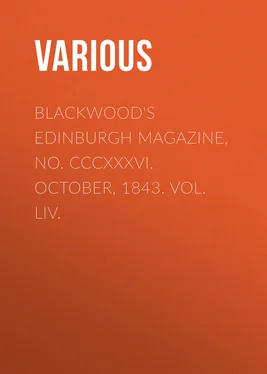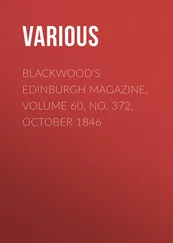Various - Blackwood's Edinburgh Magazine, No. CCCXXXVI. October, 1843. Vol. LIV.
Здесь есть возможность читать онлайн «Various - Blackwood's Edinburgh Magazine, No. CCCXXXVI. October, 1843. Vol. LIV.» — ознакомительный отрывок электронной книги совершенно бесплатно, а после прочтения отрывка купить полную версию. В некоторых случаях можно слушать аудио, скачать через торрент в формате fb2 и присутствует краткое содержание. Издательство: Иностранный паблик, Жанр: foreign_antique, periodic, foreign_edu, на английском языке. Описание произведения, (предисловие) а так же отзывы посетителей доступны на портале библиотеки ЛибКат.
- Название:Blackwood's Edinburgh Magazine, No. CCCXXXVI. October, 1843. Vol. LIV.
- Автор:
- Издательство:Иностранный паблик
- Жанр:
- Год:неизвестен
- ISBN:нет данных
- Рейтинг книги:5 / 5. Голосов: 1
-
Избранное:Добавить в избранное
- Отзывы:
-
Ваша оценка:
- 100
- 1
- 2
- 3
- 4
- 5
Blackwood's Edinburgh Magazine, No. CCCXXXVI. October, 1843. Vol. LIV.: краткое содержание, описание и аннотация
Предлагаем к чтению аннотацию, описание, краткое содержание или предисловие (зависит от того, что написал сам автор книги «Blackwood's Edinburgh Magazine, No. CCCXXXVI. October, 1843. Vol. LIV.»). Если вы не нашли необходимую информацию о книге — напишите в комментариях, мы постараемся отыскать её.
Blackwood's Edinburgh Magazine, No. CCCXXXVI. October, 1843. Vol. LIV. — читать онлайн ознакомительный отрывок
Ниже представлен текст книги, разбитый по страницам. Система сохранения места последней прочитанной страницы, позволяет с удобством читать онлайн бесплатно книгу «Blackwood's Edinburgh Magazine, No. CCCXXXVI. October, 1843. Vol. LIV.», без необходимости каждый раз заново искать на чём Вы остановились. Поставьте закладку, и сможете в любой момент перейти на страницу, на которой закончили чтение.
Интервал:
Закладка:
Her vindictive father had even made it a condition of his bounties to Lord and Lady Robert, that all intercourse should cease between them and their sister; a condition which the former, in revenge for the early slights of his fairer cousin, took care should be punctually obeyed by his wife.
Till the event of the trial, Mr Sparks retained, of course, possession of the Park; but so bitter was the mortification of the family, on discovering in the village precisely the same ungrateful feeling which had so embittered the soul of Sir Laurence, that they preferred remaining in London—where no one has leisure to dwell upon the mischances of his neighbours, and where sympathy is as little expected as conceded. But when Mary arrived— poor Mary! who had now the prospect of becoming a mother—and who, though affectionately beloved by her husband's family, saw they regarded her as the innocent origin of their present reverses—she soon persuaded her husband to accompany her to her old haunts.
"Do not imagine, dearest," said she, "that I have any project of debasing you and myself, by intruding into my father's presence. Had we been still prosperous, Everard, I would have gone to him—knelt to him—prayed to him—wept to him— so earnestly, that his forgiveness could not have been long withheld from the child he loved so dearly. I would have described to him all you are to me—all your indulgences—all your devotion—and you , too, my own husband, would have been forgiven. But as it is, believe me, I have too proud a sense of what is due to ourselves, to combat the unnatural hostility in which my sister and her husband appear to take their share. O Everard! to think of Selina becoming the wife of that coarse and heartless man, of whom, in former times, she thought even more contemptuously than I; and who, with his dissolute habits, can only have made my poor afflicted sister his wife from the most mercenary motives! I dread to think of what may be her fate hereafter, when, having obtained at my father's death all the advantages to which he looks forward, he will show himself in his true colours."
Thus, even with such terrible prospects awaiting herself, the good, generous Mary trembled only to contemplate those of her regardless sister; and it was chiefly for the delight of revisiting the spots where they had played together in childhood—the fondly-remembered environs of Stanley Manor—that she persuaded her husband to take up his abode in the deserted mansion at the Park, where, from prudential motives, Mr Sparks had broken up his establishment, and sold off his horses.
Attended by a single servant, in addition to the old porter and his wife who were in charge of the house, Mary trusted that their arrival at Lexley would be unnoticed in the neighbourhood. Confining herself strictly within the boundaries of the Park, which neither her father nor the bride and bridegroom were likely to enter, she conceived that she might enjoy, on her husband's arm, those solitary rambles of which every day circumscribed the extent; without affording reason to the General to suppose, when, discerning every morning from his lofty terraces the mansion of his falling enemy, that, in place of the man he loathed, it contained his discarded child.
The dispirited young woman, on the other hand, delighted in contemplating from the windows of her dressing-room the towers beneath, whose shelter she had abided in such perfect happiness with her doating father and apparently attached sister. They loved her no longer, it is true. Perhaps it was her fault—(she would not allow herself to conceive it could be a fault of theirs )—but at all events she loved them dearly as ever; and it was comforting to her poor heart to catch a glimpse of their habitation, and know herself within reach, should sickness or evil betide.
"If I should not survive my approaching time," thought Mary, often surveying for hours, through her tears, the heights of Lexley Hall, and fancying she could discern human figures moving from window to window, or from terrace to terrace; "if I should be fated never to behold this child, already loved—this child which is to be so dear a blessing to us both—in my last hours my father would not surely refuse to give me his blessing; nor would Selina persist in her present cruel alienation. It is, indeed, a comfort to be here."
Her husband thought otherwise. To him nothing was more trying than this compulsory sojourn at Lexley; not that he required other society than that of his engaging and attached wife. At any other moment it would have been delightful to him to enjoy the country pleasures around them, with no officious intrusive world to interpose between their affection. But in his present uncertainty as to his future prospects, to be mocked by this empty show of proprietorship, and have constantly before his eyes the residence of the man who had heaped such contumely on his head, and inflicted such pain on the gentlest and sweetest of human hearts, was a state of moral torment.
In the course of my fishing excursions—(for, thanks to Mr Sparks's neighbourly liberality, I had a card of general access to his parks)—I frequently met the young couple; and having no clue to their secret sentiments, noticed, with deep regret, the sadness of Mary's countenance and sinister looks of her husband. I feared—I greatly feared—that they were not happy together. The General's daughter repined, perhaps, after her former fortunes. The young husband sighed, doubtless, over the liberty he had renounced.
It was spring time, and Lord Robert having satisfied his cravings after the pleasures of London, by occasional bachelor visits on pretence of business, the family were to remain at the Hall till after the Easter holidays, so that Mary had every expectation of the accomplishment of her hopes previous to their departure. Perhaps, in the bottom of her heart, she flattered herself that, on hearing of her safety, her obdurate relations might be moved, by a sudden burst of pity and kindliness, to make overtures of reconciliation—at all events to dispatch words of courteous enquiry; for she was ever dwelling on her good fortune that her father should, on this particular year, have so retarded the usual period of his departure. Yet when the report of these exulting exclamations on her part reached my ear, I was ungenerous enough to attribute them to a very different origin, fancying that the poor submissive creature was thankful for being within reach of protection from conjugal misusage.
Meanwhile, she was so far justified in one portion of her premises, that no tidings of her residence at Lexley Park had as yet reached the ear of her father. The fact was, that not a soul had courage to do so much as mention, in his presence, the name of his once idolized child; and Lord Robert, having been apprized of the circumstance, instantly exacted a promise from his wife, that nothing should induce her to hazard her father's displeasure by communication with her sister, or by acquainting the General of the arrival of the offending pair. The consequence was, that in the dread of encountering her sister, (whom she felt ashamed to meet as the wife of the man they had so often decried together,) Lady Robert rarely quitted the house; and these two sisters, so long the affectionate inmates of the same chamber—the sisters who had wept together over their mother's deathbed—abided within sight of each other's windows, yet estranged as with the estrangement of strangers.
And then, we pretend to talk with horror of the family feuds of southern nations; and, priding ourselves on our calm and passionless nature, feel convinced that all the domestic virtues extant on earth, have taken refuge in the British empire!
Every day, meanwhile, I noticed that the handsome countenance of Everard Sparks grew gloomier and gloomier; and how was I to know that every day he received letters from his father, announcing the unfavourable aspect of their suit; and that (owing, as was supposed, to the suggestions of General Stanley's solicitors) even the conduct of the adverse party was becoming offensive. The elder Sparks wrote like a man overwhelmed with mortification, and stung by a sense of undeserved injury; and his appeals to the sympathy and support of his son, were such as to place the spirited young man in a most painful predicament as regarded the family of his wife.
Читать дальшеИнтервал:
Закладка:
Похожие книги на «Blackwood's Edinburgh Magazine, No. CCCXXXVI. October, 1843. Vol. LIV.»
Представляем Вашему вниманию похожие книги на «Blackwood's Edinburgh Magazine, No. CCCXXXVI. October, 1843. Vol. LIV.» списком для выбора. Мы отобрали схожую по названию и смыслу литературу в надежде предоставить читателям больше вариантов отыскать новые, интересные, ещё непрочитанные произведения.
Обсуждение, отзывы о книге «Blackwood's Edinburgh Magazine, No. CCCXXXVI. October, 1843. Vol. LIV.» и просто собственные мнения читателей. Оставьте ваши комментарии, напишите, что Вы думаете о произведении, его смысле или главных героях. Укажите что конкретно понравилось, а что нет, и почему Вы так считаете.












